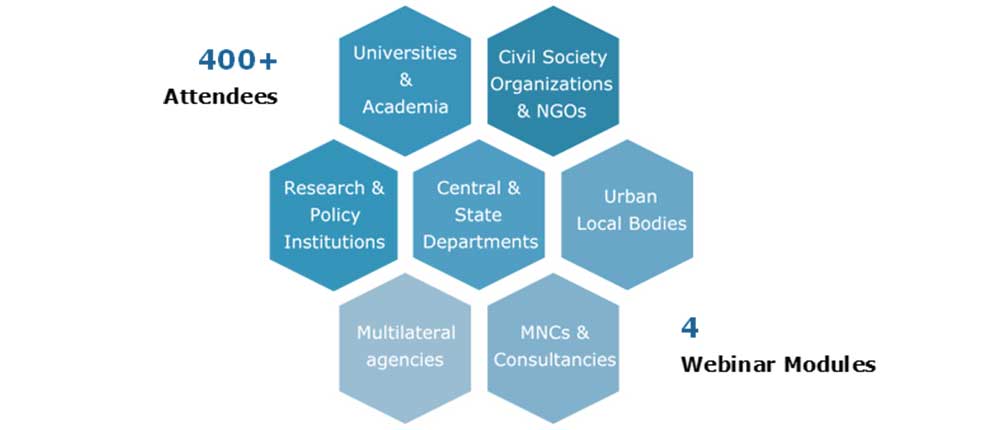Climate change impacts, such as increased rainfall intensity, sea-level rise, flooding, and heatwaves, pose significant challenges for urban systems worldwide. They adversely affect cities' basic services, infrastructure, housing, health, and economy.

On one hand, 70% of the cities are dealing with the effects of climate change, and nearly all are at risk. On the other hand, urban activities are also a major source of greenhouse gas (GHG) emissions that lead to climate change. Cities consume over two-thirds of the world's energy and account for more than 70% of global CO2 emissions. It is essential, therefore, to make cities an integral part of the solution in fighting climate change. Adapting to climatic extremes and reducing the environmental footprints that contribute to climate change is key to sustaining cities in the future.
An array of international frameworks, such as the Sustainable Development Goals (SDGs), the New Urban Agenda by the United Nations, the Paris Agreement, and the Sendai Framework for Disaster Risk Reduction, all provide pathways for cities to address climate change. As a party to these global commitments, India’s National Action Plan for Climate Change (NAPCC), 2008, and the National Disaster Management Plan (NDMP), 2016, also elaborate on strategies for reducing the vulnerability of cities to climate change. An essential component for the planning, design, and effective implementation of all these frameworks and strategies is the capacity building of relevant stakeholders. The Paris Agreement underlines the significance of capacity building and education as critical factors for bridging the gaps between technical know-how and coping capacity of cities.
Practitioners and early career researchers engaged in urban planning and policy space play an important role in promoting climate action as they are influential agents of change. Therefore, enhancing their knowledge and skills through capacity building efforts is necessary for mainstreaming climate action in cities. Towards this objective, TERI, in collaboration with the International Urban Cooperation (IUC) India programme of the European Union delivered a 4-part Webinar Series during September-October 2020. The Series was part of a capacity-building programme on 'Mainstreaming Urban Climate Action' that focused on state representatives, practitioners in Urban Local Bodies (ULBs), local to international NGOs, civil society organizations, early career researchers, and university students. It consisted of progressive topics about climate change impact on cities, as well as context-specific policy frameworks and adaptation and mitigation strategies for addressing the impacts.

Webinar Highlights
The short Webinar Series was divided into four modules that were delivered online. For each webinar, a short video on the relevant theme with informative graphics and insights from thematic experts was prepared in advance and showcased during the webinars. It was followed by an interactive Q&A session with the experts and the participants. Accompanying resource materials were provided to the participants post-webinar, that included in-depth details on the topics covered during the webinars.
Webinar Module I on Impacts of Climate Change on Cities (10th September 2020) focused on the conceptual understanding of climate change, its causes, impacts, and linkages with cities. The module also discussed the impact of climate change on various urban sectors, such as water resources, transportation, and energy. Mr Saurabh Bhardwaj, Fellow, Centre for Climate Modelling, TERI, briefed the participants on observed and expected changes in the global and regional climate. Dr Kavya Michael, Associate Fellow, Centre for Global Environment Research, TERI, articulated the potential impacts of climate change on cities, especially in the informal sector. The Q&A session of the module highlighted linkages between the measures taken towards addressing COVID-19and climate action. It was noted that the pandemic situation has sensitized governments and authorities more towards acknowledging and preparing for uncertainties, including climate change impacts, that may amplify in the future.

Webinar Module II on Frameworks for Climate Change Mitigation and Adaptation in Cities (17th September 2020) focused on the mechanisms for emission reduction and climatic risk reduction that could be adopted by cities towards building climate resilience. Additionally, climate change policies at the global and national levels that contributed to the development of such frameworks were also discussed. Mr Abhishek Kaushik, Associate Fellow, Centre for Global Environment Research, TERI, elaborated on the need for GHG accounting in cities and carbon-neutral strategies. Ms Suruchi Bhadwal, Senior Fellow, Earth Science, and Climate Change, TERI, elucidated on the pathways and options for climate change adaptation in cities. During the Q&A session, it was acknowledged that cities need to adopt several adaptation and mitigation measures, such as responsive land-use planning and infrastructure design, for addressing climate change impacts proactively.

Webinar Module III on Global and Indian Practices of Climate Action in Cities (24th September 2020) was an extension of Module II and illustrated best practice examples of climate change mitigation and adaptation strategies from cities across the globe. Mr Kamlesh Yagnik, Climate Action Expert for IUCIndia, provided an overview of measures, such as the development of flood early warning systems and large-scale biodiversity parks, that were adopted by Surat city in Gujarat towards building climate resilience. Mr Corjan Gebraad, Strategic Advisor for Urban Management Department, the City of Rotterdam, underlined the significance of public participation for implementation of climate action strategies, such as the Water Sensitive Rotterdam programme. The Q&A session of the module emphasized the city-to-city pairing and knowledge exchange between both the cities and the role of multi-stakeholder engagement for effective climate action.

Webinar Module IV on Mainstreaming City-Level Climate Action in India (1st October 2020) addressed the core drivers of urban resilience, necessary for mainstreaming climate action at the city level. It focused on themes, such as policy and institutional arrangements, data management, stakeholder engagement, and capacity building. Ms Raina Singh, Senior Fellow – Urban Resilience at the National Institute of Urban Affairs, elaborated on the existing climate change policies and planning frameworks for Indian cities. She also discussed the indicators of the Climate Smart Cities Assessment Framework (CSCAF) being implemented by the Ministry of Housing and Urban Affairs, Government of India. Mr VeivoRisto, (acting) Climate Director of the Climate and Environment Policy Unit at the City of Turku, highlighted the significance of partnerships and collaboration between city governments and relevant stakeholders (such as the Global Covenant of Mayors) for effective urban climate action. During the Q&A session, the need for statutory arrangements as well as incentives for cities to adopt effective climate action was highlighted by both the experts.
The interactive format and content of the webinar series were well appreciated by the participants and the experts. According to the feedback received, a number of participants indicated that the series contributed to their knowledge and understanding of climate change impact on cities, as well as strategies for addressing them. Some respondents pointed out that the webinars could have included more details on carbon trading strategies and methodologies for assessment of the urban heat island effect. The experts commended the format of the series that included an informative short video as a resource module for capacity building to make the webinars more focused. Few experts suggested that the discussions could have delved into the details of the strategies depending on the interest of the participants.

The Webinar Series thus brought a wide range of experts and participants together for knowledge exchange on various topics concerning climate change and urban areas. It addressed the scientific and technical curiosity of different stakeholders and advocated the need for mainstreaming climate action in cities.
